Lucidity is not a common characteristic of the Baroque opera libretto, and the anonymous text of Handel’s Alcina – drawn from an episode in Ariosto’s Orlando furioso – twists and teases more than most. Oronte is in love with Alcina’s sister, Morgana, but she loves Bradamante, who is in fact a woman disguised as her brother Ricciardo (and accompanied by Melisso, an old family friend) who is seeking to rescue her beloved Ruggiero. The latter has fallen under Alcina’s spell, his memory of his former love expunged, and is in danger of succumbing to the fate of the sorceress’s former lovers: petrification into the form of an animal, tree, rock or river. To add to the knots, Alcina herself seems quite smitten with Bradamante too, and the latter’s young nephew Oberto is wandering around the sorceress’s enchanted isle in search of his father whom Alcina has turned into a lion.
Ariosto’s Alcina is a foul, toothless, deformed dwarf, whose supernatural powers enable her to bewitch noble knights so that, believing her supremely beautiful, they lay down their arms and walk, besotted, into her illusory isle. In this, the first, production of Handel’s 1735 opera at Glyndebourne, the Italian director Francesco Micheli translates Ariosto’s fading chivalric world to 1960s Italy, and supplants Alcina’s pastoral Arcadia with L’isola d’Alcina, a revue show at the Teatro Lirico, turning the sorceress into a showgirl whose sumptuous charms have hooked the businessman Ruggiero.
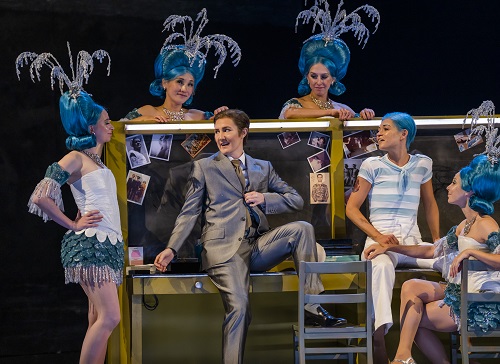
There’s plenty of business during the overture. Cranes and skyscrapers dominate a grey metropolis in the process of reconstruction. Charts and strategies are displayed: the Teatro Lirico is to be knocked down, Ruggiero to be saved from his infatuation. And, so, we enter the retro glamour of the theatre which – though we are in Milan rather than Rome – Micheli imbues with the dream-like surrealism of Fellini’s La dolce vita, the hedonistic excess of artifice threatened by a hidden but ever-present melancholy.
It’s certainly a feast for the eyes. Edoardo Sanchi’s sets whirl, swirl and wheel from opulent cabaret stages to the glass-glinting theatre bar and on to dingy backstage dressing-rooms, Bruno Poet’s dashing, deep-hued lighting heightening the headiness. Alessio Rosati’s costumes are wonderfully excessive – Morgana is a scarlet mermaid beckoning the punters onto the rocks of revelry; the corps of lithe and leggy dancers flourish their peacock trains with arch grace (choreography Mike Ashcroft); Alcina dons Marie Antoinette’s ship headdress atop a gown adorned with drowning cherubs – and the extravagance serves to emphasise the corporate greyness of Alcina’s rejected lovers, who sit in a theatre box wearing animal masks, watching the variety with languid listlessness.
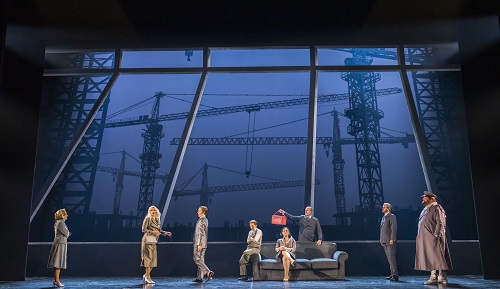
In some ways, Micheli’s conception makes perfect sense. Alcina’s island exists only in the imagination of those duped into suspending their disbelief – just as her beauty, too, is illusory, freeing those who are entranced from the social conventions which bind them, allowing them to dare to explore realms they would otherwise deny and from which they would desist. Why not present her palace as a fragile theatrical set, a magical manifestation of what those who enter it desire – a self-indulgent representation without constraint, a temple of pleasure, fascinating but flimsy. And, Alcina herself is indeed a ring-master: her own sorcery, or theatrical ‘act’, sustains the illusion as she works her magic from within a stage set which teeters on the cusp of crumbling.
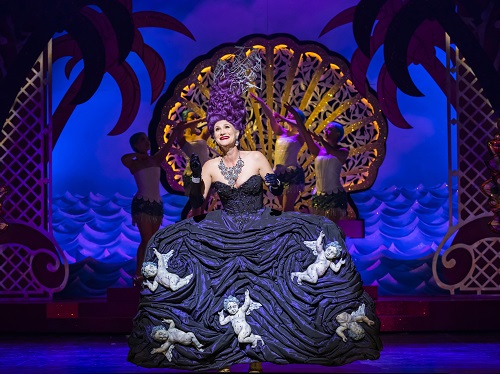
Handel’s magic is, however, sustained by the music and Micheli is fortunate that his eight singers, several making their Glyndebourne debuts, are able to offer aural enchantment equal to the visual confection that the director conjures. And, they are supported by brilliantly buoyant playing from the Orchestra of the Age of Enlightenment, conducted by Jonathan Cohen.
The women complement each other gratifyingly. Jane Archibald was absolutely committed to conveying Alcina’s sassy swagger, and if she sometimes she pushed her full-bodied soprano a little too hard through the sorceress’s histrionics, then the coloratura of ‘Ah! mio cor’ and ‘Ma quando tornerai’ was agile and spirited, and she coped easily with some of the lower-lying runs. There was much fine detail, notably so in the recitativo accompagnato ‘Ah! Ruggiero crudel’ and in ‘Mi restano le lagrime’ in which Alcina’s diverse emotions were communicated touchingly.
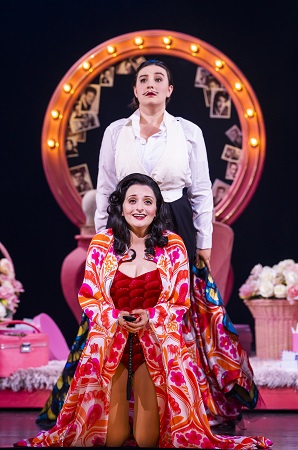
Samantha Hankey took a little while to settle into the role of Ruggiero, but her soft-grained sound was immensely beautiful in ‘Verdi prati’, which was deeply contemplative and eloquent, and she brought excitement and punch to ‘Sta nell’Ircana’, complemented by the ringing tones of the horns of the OAE. As Morgana, Soraya Mafi sparkled in ‘Tornami a vagheggiar’, dancing evenly and crisply through the dazzling decorations, while ‘Credete al mio dolore’ was poised and expressive, its elegance aided by a lovely cello obbligato. Mezzo-soprano Beth Taylor negotiated Bradamante’s fiery runs with aplomb, displaying a fine chest voice. As Oberto, Rowan Pierce’s bright tone complemented her gamine persuasiveness.
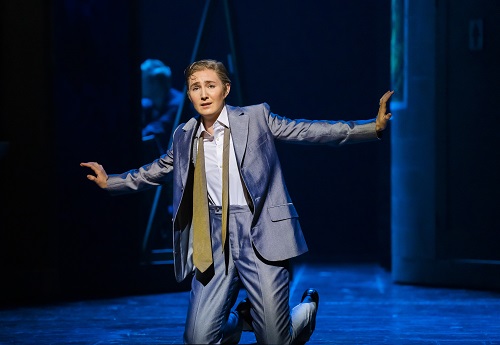
As Oronte – Alcina’s white-suited maitre d’ – Stuart Jackson displayed a gracious tenor in ‘Un momento di contento’, a welcome moment of stillness in what was otherwise an exaggerated characterisation. Alistair Miles didn’t quite have the requisite nimbleness for Melisso’s single aria but did summon the necessary gravity. James Cleverton completed the cast as Astolfo.
In embedding theatrical artifice within the operatic frame, Micheli heightens the illusory caprice but dispenses with the opera’s courtly traditions and pastoral symbolism. He also robs the two sisters – born of incest in Ariosto, but treated more affectionately by Handel – of their humanity. For, as Domenico Pietropaolo observed in his 2003 article ‘Alcina in Arcadia’, both the playful Morgana and the impassioned Alcina are truly in love. And, this is what Handel’s music shows us. Thus, Alcina’s ‘Ah! Cor mio!’ is deeply expressive of not just the grief caused by Ruggiero’s betrayal but of her womanhood. She has fallen for the power of true love and has lost everything: Ruggiero and her kingdom. But, in Micheli’s theatre, the mask can never slip and so Alcina must leave her dressing-room and the show must go on.
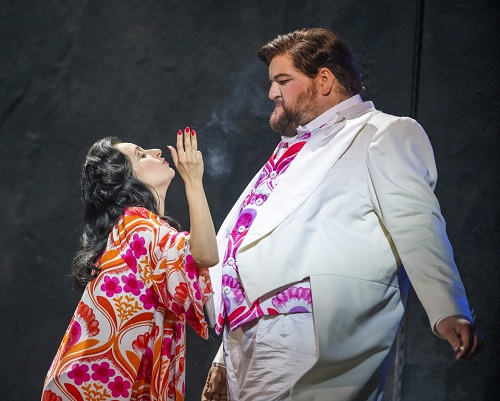
Moreover, Micheli’s ending subverts the essential sadness of Handel’s opera. In his transformative aria, ‘Verdi Prati’, it is with nostalgia and regret that Ruggiero – sung originally by the castrato Carestini who cannot have been unaware of the ironic contrast between the pleasures of theatre and those of real life – recognises the ugliness of the island landscape and, his Dionysian impulses quelled by Apollonian duty, turns from sensuous excess to chivalric honour. Alcina’s deception revealed, she must be punished. Like Prospero’s broken staff, the urn that is the source of her magic is shattered by Ruggiero, who refuses her appeals: her palace crumbles to dust and, as she and Morgana vanish, her lovers return to their proper form.
In Micheli’s production, though, Alcina’s magic is resurrected, as Ruggiero discovers the sorceress’s copy of Orlando furioso and is seduced by its stories. The men promptly swap their grey suits for white theatre costumes, Ruggiero donning Alcina’s own attire. Micheli seems to suggest that the sweetness of artifice lives on, thereby denying Alcina her tragic fate and disregarding the melancholy that Handel reveals as a hidden blemish underlying human pleasure.
Claire Seymour
Bradamante – Beth Taylor, Melisso – Alastair Miles, Morgana – Soraya Mafi, Alcina – Jane Archibald, Oberto – Rowan Pierce, Ruggiero – Samantha Hankey, Oronte – Stuart Jackson, Astolfo – James Cleverton, Dancers – Soledad de la Hoz, Chloe Dowell, Keiko Hewitt-Teale, Bianca Hopkins, Lily Howkins, Megan Francis King, Rebecca Lee, Oihana Vesga; Director – Francesco Micheli, Conductor – Jonathan Cohen, Set Designer – Edoardo Sanchi, Lighting Designer – Bruno Poet, Costume Designer – Alessio Rosati, Choreographer – Mike Ashcroft, The Orchestra of the Age of Enlightenment.
Glyndebourne Festival Opera; Saturday 2nd July 2022.
ABOVE: Soraya Mafi (Morgana) © Glyndebourne Productions Ltd. Photo: Tristram Kenton